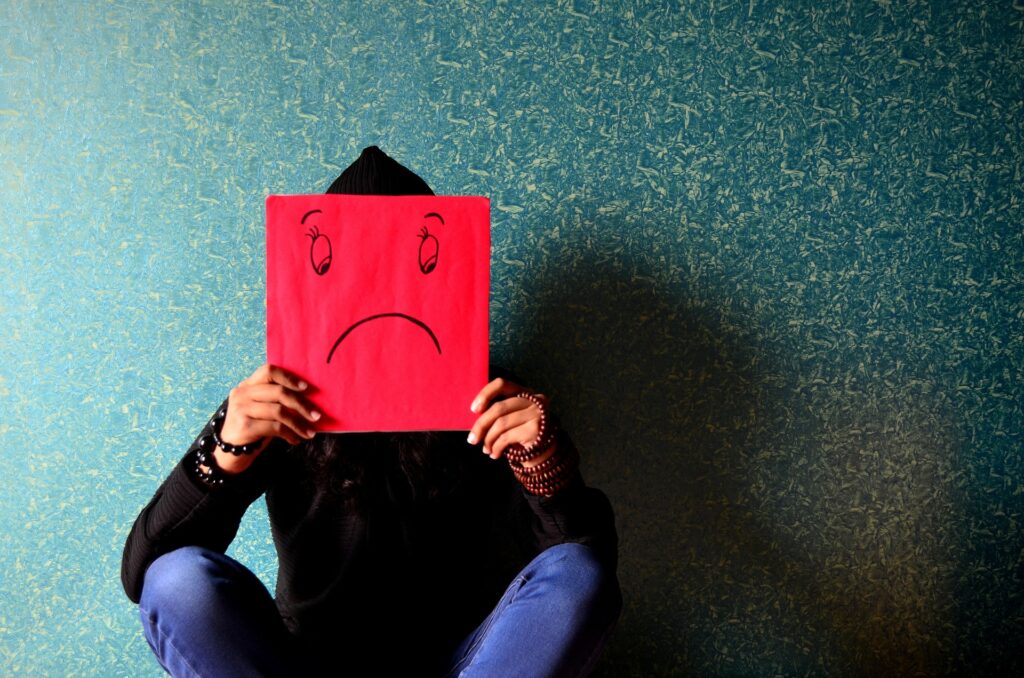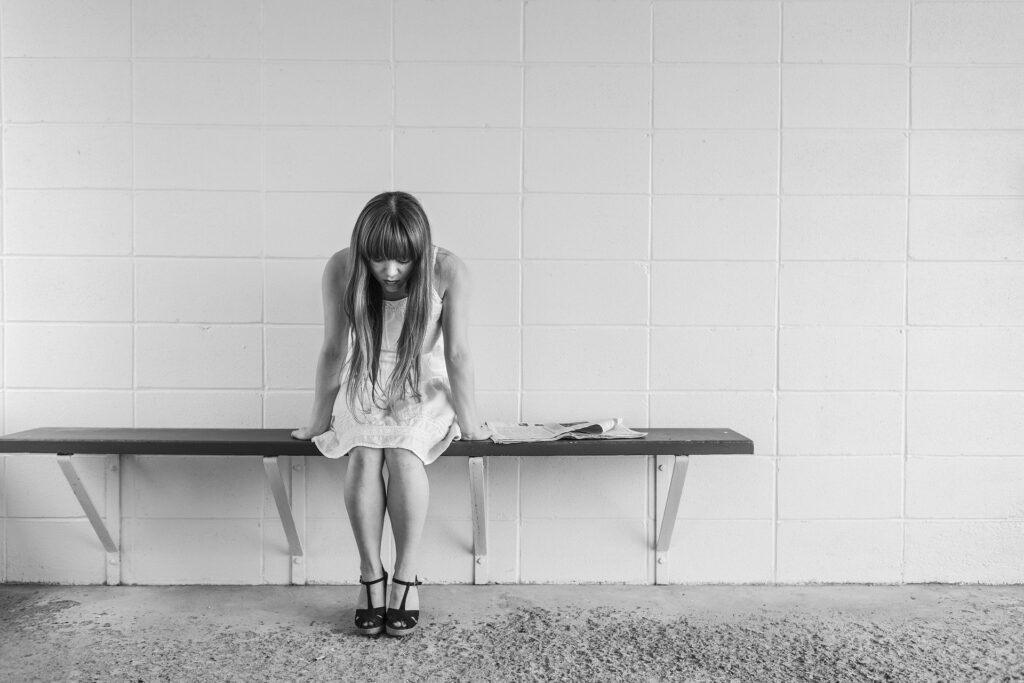Depression Is Not Sadness
September 24, 2021
By counselingwithnatalie
September 24, 2021
By counselingwithnatalie
Envision the reality that you are drowning.
Above you, the water’s surface is far off and daunting, at no less than the distance of five times your height. The pain in every ounce of your body is crippling- your lungs filling to capacity and stifling the last breath out of you, your limbs heavy as the depths seem to anchor you closer and closer to whatever infinity lies beneath your feet. The rest of your body has grown numb while your mind and your core battle each second for the possibility of a chance at survival. Suddenly, you catch a glimpse at your surroundings through the water’s obscurity, only to see familiar faces. Your family, friends, people that you do and don’t associate with in your daily life, all carrying on with their lives. They’re staying afloat effortlessly and, of course, breathing just fine.
“Why can they breathe under all of this water, yet you somehow cannot?” “What do they have that you don’t?”
In actuality, the question would be better asked “What do you have that they don’t?”. You, my dear, have depression.

While the act of drowning doesn’t equate to having depression on literal terms, the analogy holds much credibility. A persisting sense of numbness to everyday feeling, inexplicable reasoning behind the “why” of much of the pain, the constant and exhausting battle to push on another second in hopes that the pain ends at some point soon, and a number of other branches of overlap make the physical experience of one accurate to the emotional aspect of the other.
Clinical depression lies within a whole other realm of what is characteristic of mere “sadness”. This is not to belittle sadness, but to state that they truly don’t reside on the same spectrum.
Experiencing sadness is simply a notable fraction of the human experience and is, in fact, a healthy experience by nature. To have the ability to experience sadness in response to disappointing and negative events in life is crucial. It serves as a form of guidance through the trials and tribulations faced and is key to the manner in which we process our emotions. In order to tackle any given situation, judgement is required to figure the best possible manner of avoiding consequences. It is fear of loss and pain- sadness- that allows us to appeal to our better judgement. Not getting a promotion, losing a loved one, financial burdens, a harsh breakup and grief on similar planes are all triggers to bouts of sadness, both slight and extreme. With sadness, much relief can be obtained by more natural means, such as crying and letting one’s grievances out through expression. Grief can become as intense as to cause difficulty sleeping, weight loss/gain and loss of appetite, but these hinderances lessen over time. With sadness, time truly does heal immensely.

Clinical depression, on the contrary, is less of just a feeling and more of a lifestyle. Alongside the torturous experience within, there comes with it also the stigmas that a sufferer of depression must live with in having their genuinely life-threating symptomologies overlooked as minor sadness. For this reason, comprehending the distinctions between the two is essential. While sadness is a largely distinguishable factor of depression, it is nothing to define it. Depression is a very real and abnormal condition that is much more pervasive and persistent than sadness. There is no benefit to experiencing it, no given cycle, or ordinary healing phase. It’s an illness of mind that considerably interferes with the victim’s functionality. A major contributor to the destructive nature of depression lies within its lack of general place and timeline. Resulting from as wide an array of sources, as genetic variation, chemical imbalances within one’s biology, environmental factors, traumatic impact, and various other components, there is no certain means of avoiding the occurrence of depression in any one person, nor is the sufferer ever at fault for their condition.
Clinical depression, especially without treatment through medicinal and professional means, doesn’t self-cure. As opposed to bettering with time, depression usually becomes dangerously worse. A depressed individual may reside in a continuous state of unnecessary guilt or impending doom. Living is no longer living, but only existing. For Harry Potter fans out there, consider the likes of a Dementor’s Kiss; the dementor sucks the soul out of a person, leaving
only an empty shell of a life form, as does depression, comparably, greatly inhibit a person’s emotionality and blanket essences of their true personality under the pain that they suffer.

While symptoms of grief are not fatal, depressive symptoms are, and are usually inclusive of almost daily instances of the following (Bruce, 2008): “insomnia/hypersomnia (sleeping excessively), fatigue or loss of energy, feelings of worthlessness or guilt, impaired concentration, indecisiveness, anhedonia (markedly diminished interest or pleasure in almost all activities nearly every day), restlessness or feeling slowed down, recurring thoughts of death or suicide, significant weight loss or gain (a change of more than 5% of body weight in a month)”, etc.
Untreated, the severity of the condition may be the difference between a growing pessimism about the prospective future and a suicidal attempt. With this, it’s safe to state that depression is not meant to be an opportunity to prescribe a mental strength building exercise to someone that is being impacted by it. The extent of depression and the severity with which it impacts someone has nothing to do with strength or weakness, in the same manner that someone battling Stage 4 vs Stage 1 cancer does not get to choose the rigor with which their condition attacks their body. As cancer is the metastasis of cells, depression is the metastasis of cognition.
As with anyone, the lack of being understood by the important people in one’s life worsens the symptoms because the victim feels more alone and at fault for their condition. Instead, offer to be a root of emotional support while assisting them in finding sources that can help better their condition, such as cognitive behavioral therapists and psychologists. Decreasing the probabilities of impact and even reversing depressive damage are very much doable with the right care and shoulders to lean on. Seeing as being subjected to toxic environments can be the trigger for the depressive condition and symptoms, one could correctly assume that favorable and encouraging surroundings can tremendously benefit anyone prone to the effects of clinical depression. In doing this, the victim is reminded that they have a mental condition, but they are not their condition. They are not their depression.

To provide a better insight into the firsthand perspective of depression, here are a few notable quotes from some reminiscing it (Amatenstein, 2020):
If you are in need of counseling please visit www.tampacounselingplace.com or visit www.counselingwithnatalie.com/realtalk for a texting chat option.
Written by Kristen Racktoo, Content Research Intern
References:
Amatenstein, S. [PsyCom], LCSW. (2020, September 3). Quotes About Depression & What it Feels Like to Sufferers [Video]. Psycom.Net – Mental Health Treatment Resource Since 1996. https://www.psycom.net/depression-what-depression-feels-like?slide=10#slide
Bruce, D. F., PhD. (2008, June 19). Major Depression (Clinical Depression). WebMD. https://www.webmd.com/depression/guide/major-depression
PsychHub. (2021, July 12). #LetsTalkAboutIt: What is Depression? [Video]. YouTube. https://www.youtube.com/watch?v=ysohFFqiLJI
Tags